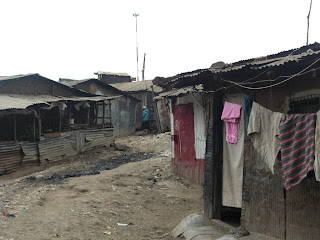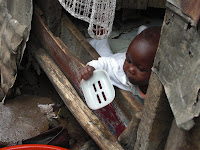 Over the past two months I have done a lot of on-the-ground work with TechnoServe. While working with the Young Women in Enterprise (YWE) program, I have made frequent field visits to two of Nairobi’s biggest slums–Mathare and Kawangware. Because of where we are in the project, we have started going to the slums as often as three times a week. Every time is a new experience for me. The first time I went to the slums, I had to take some time to digest what I saw. I have seen poverty before while traveling abroad, and even in the U.S., but never like I have in Nairobi. As a tourist you’re shielded from seeing what everyday life in poverty is like. When you work in the slums, you see the aspects of poverty (and I mean extreme, <$1/day poverty) that you never thought you would.
Over the past two months I have done a lot of on-the-ground work with TechnoServe. While working with the Young Women in Enterprise (YWE) program, I have made frequent field visits to two of Nairobi’s biggest slums–Mathare and Kawangware. Because of where we are in the project, we have started going to the slums as often as three times a week. Every time is a new experience for me. The first time I went to the slums, I had to take some time to digest what I saw. I have seen poverty before while traveling abroad, and even in the U.S., but never like I have in Nairobi. As a tourist you’re shielded from seeing what everyday life in poverty is like. When you work in the slums, you see the aspects of poverty (and I mean extreme, <$1/day poverty) that you never thought you would. Since my first visit, I have become much more prepared for our visits to the field; however, the experie
 nce is still exhausting--both physically and emotionally. We spend hours walking through narrow alleys between rows of shanties. Every one of your senses is heightened in the slums. You smell a combination of meat, raw sewage, illicit alcohol brewing in the distance, and burning trash. You see kids running on sludge covered rocks in their bare feet; goats, dogs, cats, chickens–all sorts of animals wandering; people wearing donated shirts with NBA sports teams logos or that say “Roosevelt High School Class of 1998”. You hear kids screaming "mzungu, mzungu!" or chanting “How are you? How are you? How are you?” Apparently that’s all the English they know. They love to come up to you and squeeze your hand or hug you. That’s my favorite part.
nce is still exhausting--both physically and emotionally. We spend hours walking through narrow alleys between rows of shanties. Every one of your senses is heightened in the slums. You smell a combination of meat, raw sewage, illicit alcohol brewing in the distance, and burning trash. You see kids running on sludge covered rocks in their bare feet; goats, dogs, cats, chickens–all sorts of animals wandering; people wearing donated shirts with NBA sports teams logos or that say “Roosevelt High School Class of 1998”. You hear kids screaming "mzungu, mzungu!" or chanting “How are you? How are you? How are you?” Apparently that’s all the English they know. They love to come up to you and squeeze your hand or hug you. That’s my favorite part.My work has mostly entailed visiting each of the girls who have started a business ("bizna" in sheng, kiswahili slang) to see how her business is progressing. We go through the girl’s financial records (which most keep very well) and try to determine how to scale up her business. We help the girls with marketing and branding their products so that they can reach more customers. It is strange to use highly technical terms like profit margin, cost driver, credits, debits, etc., with these girls and in such a setting. Most of these girls have not finished high school (nor will they ever likely complete high school) and yet they have a knack for business. They know how to gain a good customer base and build customers’ trust.


We have had a total of ~93 businesses that have started so far and our target is 126 by the end of September. Some examples of the types of businesses I have visited include:
1. Liquid soap maufacturing (e.g., Looking Beyond, Arise and Shine, Jelt Group)
2. Food cafes (e.g., Riziki Café, Norway Café, Namukhula Hotel, Tabitha Hotel)
3. Hair salons (e.g., Pink Lady Saloon, Popsy Salon, Wamboi Salon, Nyambura Salon)
4. Second-hand clothes retail (e.g., Best Wear, Hitech Mitumba, Mn’garo Kids)
5. Embroidery and tailoring (e.g., Plainfield Textiles, Hope & Faith, Lucky Outfitters)




As little as the profits are that these girls are making, they still have more financial independence than they have ever had before. In the two months I have been visiting them and their businesses have been growing, I have seen them gain a lot of confidence. They are more engaged in the counseling sessions we provide and readily offer their opinions and suggestions. In addition to the six month entrepreneurship training they received from TechnoServe, they are also getting free ICT training from The African Center for Women in Information Communications Technology (ACWICT). I have heard the girls' life stories–about hunger, HIV/AIDS, family illness, losing parents/children, domestic abuse, robbery–and it is amazing to see their resilience. They are still motivated enough to seek a better life for themselves and their families. It's good, meaningful work that TechnoServe is doing in Kenya and I'm happy to have played my part in it.


Moving post
ReplyDelete